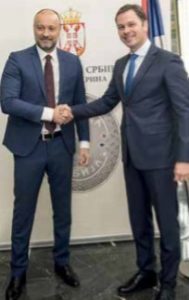Serbia mostly exports to Italy cars, iron products, footwear, socks and tires

All Italian companies in Serbia are export-oriented and this was one of the topics to talk about with the Acting Director General of the Customs Administration, Miloš Tomić, and about import and export procedures, legal regulations, as well as the cooperation with the Italian counterparts.
What are the biggest obstacles to the import customs procedure?
– The Customs Administration fully understands that business companies in the EU have forgotten what customs clearance means because they have had no borders, but do have free flow of goods for a long time, and this does not mean that we can abolish the customs procedures. In terms of our customs clearance procedure, there are certain documents that still need to be obtained for import, while a special license or certificate is required for some goods. Sometimes there are misunderstandings or inadvertent omissions which subsequently prolong the procedure. Therefore, everybody interested in cooperation has to thoroughly analyze the conditions under which their business ideas can be realized in the most efficient way possible.
What measures does the state plan to undertake in order to facilitate the flow of goods and services?
-In order to improve the relations with the business community, the Customs Administration continues to issue approvals for the implementation of simplified customs procedures to companies that operate conscientiously and in accordance with the law, which enabled their more efficient and more economical operations. We started to implement simplified procedures back in the autumn of 2010, and so far, the number of companies implementing these procedures has been constantly growing. In 2014, we introduced the status of Authorized Economic Operator, thus creating a partnership between the private and public sectors. Three years ago, the Customs Administration automated transit, thus enabling goods from the European Union, the EFTA countries, Turkey and North Macedonia to be transported through Serbia based on an electronic declaration, which means that borders have virtually ceased to exist for the transit of goods. We still need to implement an automated import and export system on the principles of electronic, i.e. paperless business, which will make this segment of customs operations fully harmonized with EU standards. The preparatory phase for the introduction of automation into customs procedures will be completed in September 2019, while the plan for full automation is to come to life in 2023.
What is the cooperation between our Customs Administration and Italian customs authorities like? Do we have some common projects?
– The Customs Administration of Serbia is continuously developing good cooperation with the Italian Customs and Monopoly Agency based on the Stabilization and Association Agreement, as well as the Agreement on Mutual Administrative Assistance in Prevention, Investigation and Suppression of Customs  Offenses, signed by the two governments in November 2010. At the end of June 2012, the Memorandum of Understanding, signed by the Customs Administration of the Ministry of Finance of the Republic of Serbia and the Italian Customs and Monopoly Agency, came into force and as such, takes a significant place in the bilateral cooperation, as it refers to operational cooperation. The document highlights the following: strengthening of customs controls, improvement of the customs system of risk management, exchange of experiences, best practices and information in order to achieve a more optimal environment for control of the implementation of regulations and trade facilitation, in addition to granting benefits to companies whose business operations comply with the law. The Serbian Customs Administration has successful cooperation with its Italian counterparts also through the exchange of intelligence, the information on goods, customs procedures and participants in them, as well as through the exchange of documentation. The exchange of information primarily relates to the verification of shipments of goods of legal entities and natural persons in the context of involvement in specific customs offenses, as well as following on suspicion of smuggling. From 2008 to date, 6 projects have been implemented through which systemic electronic exchange of data (SEED) in the Western Balkans has been developed.
Offenses, signed by the two governments in November 2010. At the end of June 2012, the Memorandum of Understanding, signed by the Customs Administration of the Ministry of Finance of the Republic of Serbia and the Italian Customs and Monopoly Agency, came into force and as such, takes a significant place in the bilateral cooperation, as it refers to operational cooperation. The document highlights the following: strengthening of customs controls, improvement of the customs system of risk management, exchange of experiences, best practices and information in order to achieve a more optimal environment for control of the implementation of regulations and trade facilitation, in addition to granting benefits to companies whose business operations comply with the law. The Serbian Customs Administration has successful cooperation with its Italian counterparts also through the exchange of intelligence, the information on goods, customs procedures and participants in them, as well as through the exchange of documentation. The exchange of information primarily relates to the verification of shipments of goods of legal entities and natural persons in the context of involvement in specific customs offenses, as well as following on suspicion of smuggling. From 2008 to date, 6 projects have been implemented through which systemic electronic exchange of data (SEED) in the Western Balkans has been developed.
The leading institution on all projects was the Italian Customs Administration, which implemented the last 4 projects through multi-benefit-ciary IPA projects. In addition to the SEED, the INES+ application for the protection of intellectual property rights was created as a result of these projects. The application provides users with an insight into one of the European customs systems, while at the same time, it enables the complete electronic operations between the Customs Administration and legal representatives of holders of intellectual property rights in Serbia. The experiences and methodology of the Italian Customs contributed to the establishment of a better and more efficient cooperation between the Serbian Customs Administration and the Tax Administration with other state authorities and the business community in preventing tax evasion and fraud in international trade thanks to the twinning project realized in cooperation with the Tax Administration of the Republic of Serbia and the Italian Customs and Monopoly Agency as a twinning partner. A project worth 1.4 million euro was implemented from August 2011 to February 2013 and was funded by the EU under the IPA 2008 program.
According to the customs statistics, which products are the most represented in the external trade between Italy and Serbia in 2018?
– Italy is one of the biggest trading partners of Serbia, as evidenced by the fact that the value of the total external trade between our two countries in 2018 stood at over 3.6 billion euro. If we look at the period starting with the introduction of the simplified procedures in October 2010 to the present, the external trade has increased more than double. In terms of representation of goods in common trade, we mostly export to Italy cars, iron products, footwear, socks and tires, and import mostly leather, motor vehicles for the transport of goods, yarn, as well as passenger cars.
What role does the Serbian Customs Administration play in Serbia moving towards the EU membership? To what extent have we harmonized our legislation with the EU’s one and what else is left to do?
– The Serbian Customs Administration plays a significant role in Serbia’s path towards the EU. Namely, we actively participate in the work relating to several negotiation chapters, bearing in mind the fiscal, protective and security role that the customs service has in the society from which a number of competencies stem. The negotiation chapter 29 – Customs Union – is by far the most important for the Customs Administration of Serbia. In 2014, Serbia and the EU successfully completed the phase of the analytical review of legislation, the so-called screening, in relation to this chapter. Based on the screening report, basic assessments and recommendations of the EC that the Serbian legislation is, for the most part, in line with EU Acquis in the segment of the customs union, the negotiations in this chapter were opened in 2017. Our legislation is almost completely harmonized with the EU regulation. The new Customs Law, which came into force in December 2018, and which implementation begins on June 17th this year, is harmonized (around 98% of it) with the Union Customs Code of the EU and is based on the improvement and simplification of all customs procedures for the purpose of facilitating external trade. Among other things, it envisages a fully electronic environment, as well as new forms of customs simplification.
What should Italian companies pay attention to, when exporting goods to Serbia?
– The basic recommendation to Italian companies would be to be well-informed because if they are, everything is easy. They can always contact the Chamber of Commerce and Industry of Serbia or the Italian – Serbian Chamber of Commerce in Belgrade which provide support to business people in order to contribute to the development of external trade between our two markets. They can find out in advance what documents they need for the goods they intend to export and what are the specificities of customs procedures that await them. With such an approach, every business venture will run smoothly and without any delay.